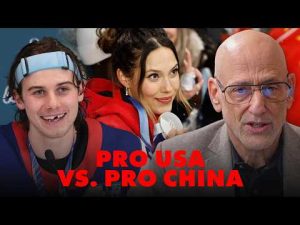**Ezra Levant’s Arrest: A Tumultuous Tangle of Journalism and Protest in Canada**
Just when you thought it was safe to stroll the streets of your own neighborhood, Ezra Levant, a prominent journalist and publisher of Rebel News, found himself entangled in an unusual incident during a pro-Palestinian protest in Toronto. Imagine standing on a sidewalk, armed only with a cell phone and a desire to report the news, when suddenly your own government turns against you. That’s exactly what happened to Levant, who has become a symbol of the ongoing struggle for free speech in Canada.
Levant lives just a stone’s throw away from the protest site. He noticed a peculiar event planned by some pro-Hamas activists, a reenactment of the last moments of Yaya Sinir, the head of Hamas, in an area primarily populated by Jewish families. Intrigued yet concerned, Levant decided to document this unusual spectacle through his camera lens. But before he could capture any shots, police officers swooped in, pushing him away like a pesky bee buzzing too close to their picnic. Was he causing a disturbance, or merely doing his job? The police seemed to think the latter was unacceptable, placing Levant in handcuffs and taking him away for the crime of being Jewish and present on a public sidewalk.
One might think that in a developed democratic society, citizens have the right to express themselves—even if that means reporting on protests they disagree with. However, the situation for Levant painted a bleak picture. He described the police’s actions as illegal, citing a recent Supreme Court ruling in Canada that stated it’s unlawful to arrest someone who isn’t committing an actual crime. It appeared that, for the officers involved, Levant’s mere presence was enough to trigger a “threat” in the minds of the protesters. Strange times indeed, when standing quietly on public property can land a journalist in handcuffs, but here we are.
As Levant recounted his experience, he could not shake off the absurdity of the situation. He noted how his arrest seemed to energize the very protesters he sought to cover, who cheered as he was taken away. It raises the question of how far Canada has drifted from the ideals of free expression. In many ways, Levant’s experience is a cautionary tale, a warning to Americans about the importance of safeguarding their First Amendment rights. Without vigilance, the freedom to report and express oneself could become a distant memory.
Meanwhile, amidst the chaos, Canadian Prime Minister Justin Trudeau appeared to be out of touch, enjoying a dance at a Taylor Swift concert instead of addressing the spiraling unrest in his country. Critics pointed out that Trudeau’s administration has allowed anti-Semitic sentiments to fester across Canada, nurturing a particularly unsafe environment for Jewish communities. The irony that a leader prioritizes partying over pressing national issues is not lost on many citizens who are searching for decisive action.
As if the protest scenes weren’t alarming enough, there’s rising concern around the handling of immigration in Canada. Reports indicate that rampant unchecked immigration has contributed to the unrest, with a significant number of foreign nationals participating in protests laden with anti-Semitic rhetoric. Levant expressed worry that immigration policies have opened the floodgates for individuals with views that clash with Canadian values. It begs the question: how can a nation maintain social harmony if it does not vet those it allows to enter its borders thoroughly?
In the aftermath of this incident, Levant plans to pursue legal action, for it’s clear that this was not just a case of bad judgment but a glaring violation of his rights as a journalist and citizen. As Levant and many others reflect on these events, they remind us all to stay vigilant in defending our rights and freedoms. In an ever-changing landscape, the ability to report facts and ask questions is a cornerstone of a thriving democracy. In Canada, the warning signs are evident, and it’s time to take notice before the curtain falls on freedom of expression, one arrest at a time.







